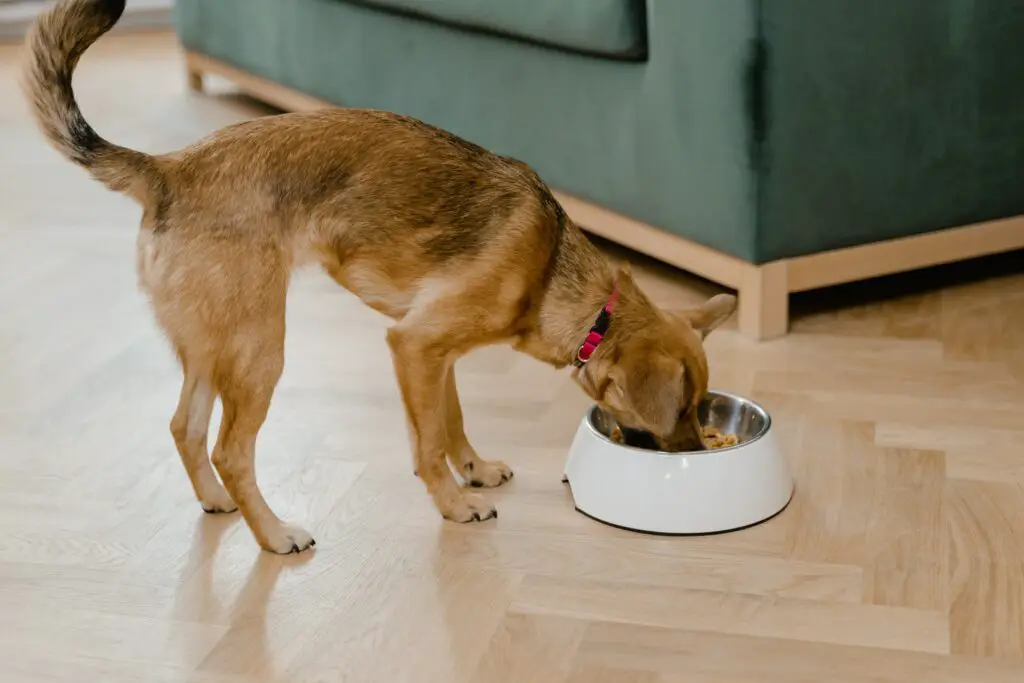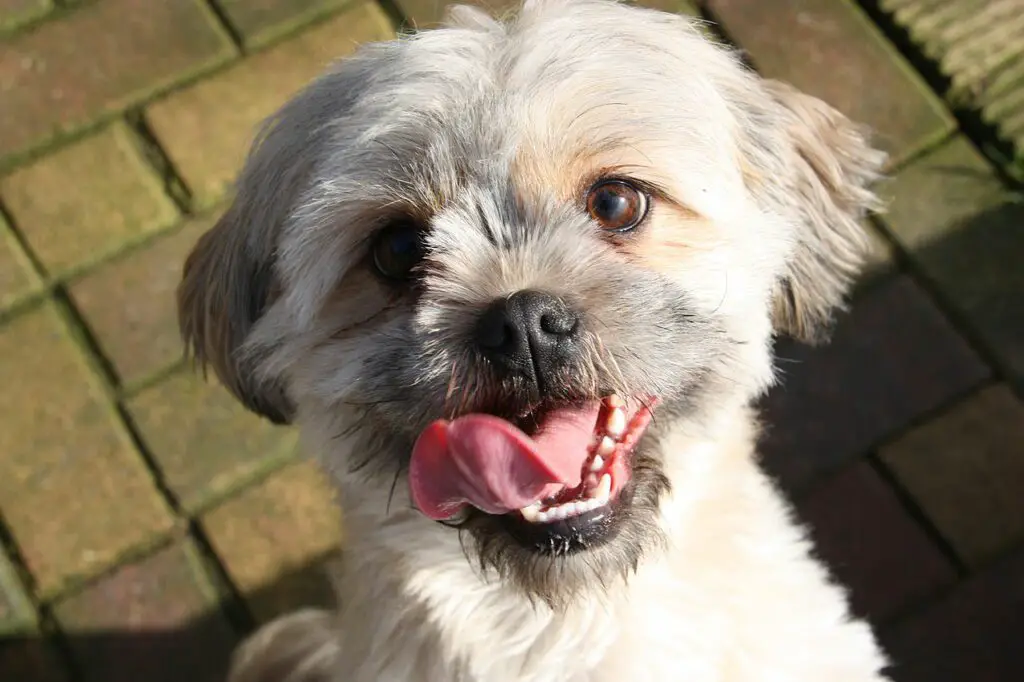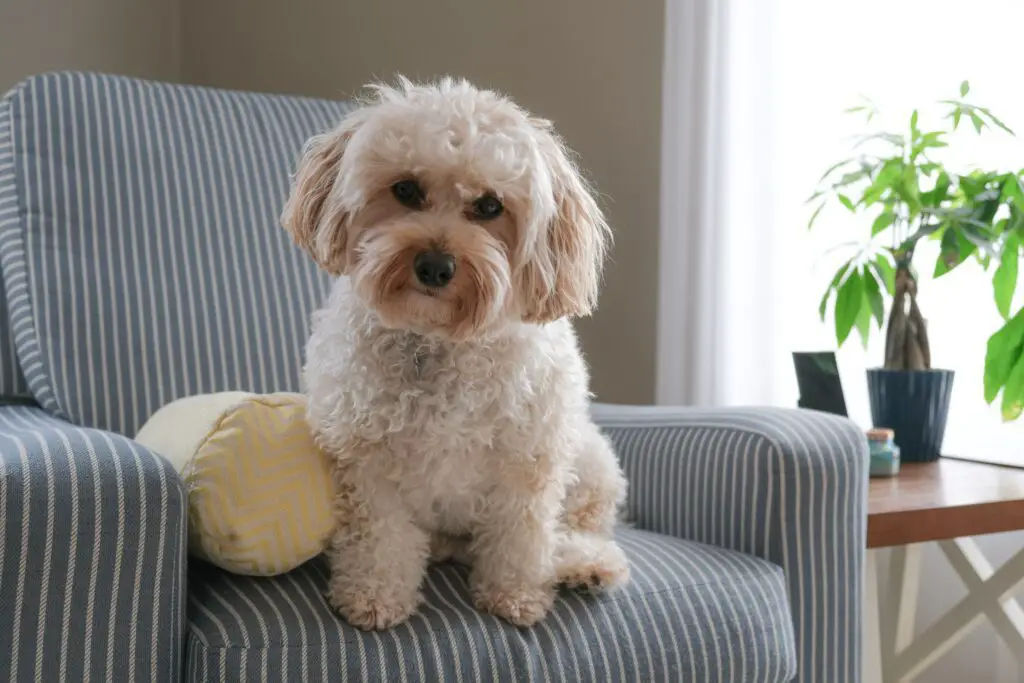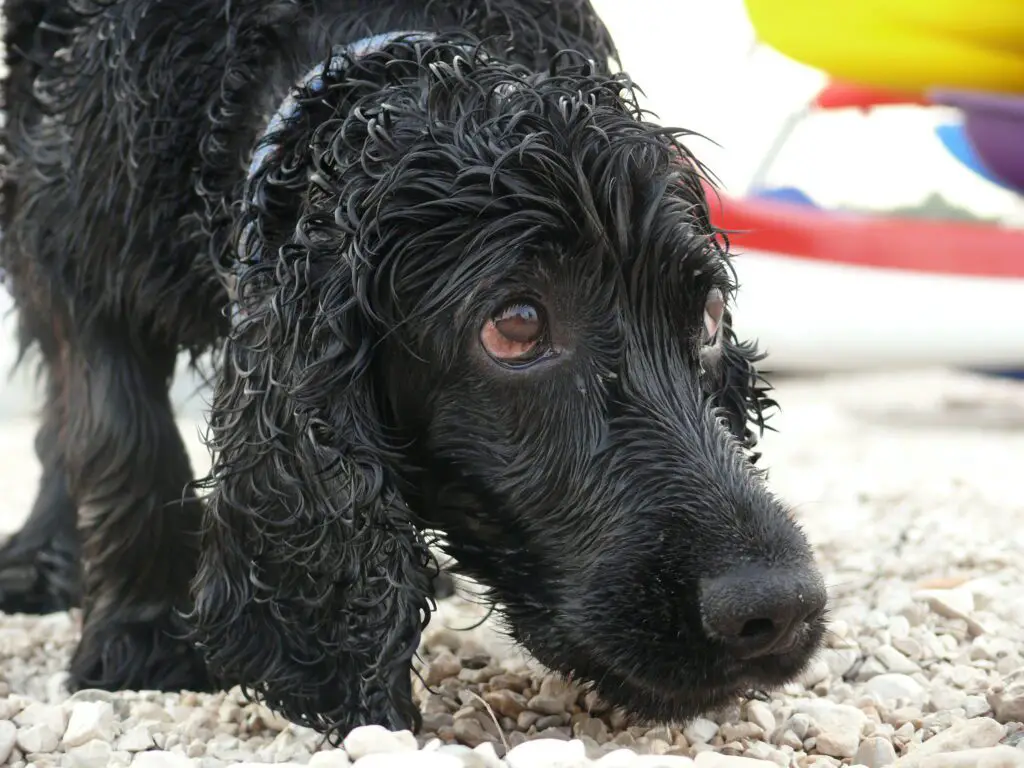A hiccup is an involuntary spasming of the dog’s diaphragm.
When a dog breathes in, the diaphragm contracts and it moves downwards into the chest cavity to make more room for the lungs.
When the dog breathes out, the diaphragm relaxes and moves back up into the chest cavity. This movement up and down should be smooth.
If there are spasms in the diaphragm, it will result in hiccups. But, why does a dog get hiccups in the morning?
Key Takeaway
- A dog can get hiccups in the morning if it’s ingesting too much air while eating or drinking (more preset in young puppies), the body is trying to relieve stomach aches and gassiness, reverse hiccups from excitement, asthma, or hypothermia.
- While occasional hiccups in dogs are normal and typically not a cause for concern, if your dog’s hiccups persist for more than a few hours, become regular, or are accompanied by other symptoms such as irregular or labored breathing, it’s recommended to consult with a vet.
Why Does My Dog Get Hiccups In The Morning

Your dog may get hiccups in the morning due to irritation in the diaphragm caused by eating or drinking too fast, excitement, stress, or changes in breathing patterns.
1. Eating or drinking too fast

The hiccups are caused by an involuntary muscular spasming of the diaphragm that occurs when a dog ingests large amounts of air while gulping down their food.
If you have ever seen your pup make a strange gas-like sound in the middle of their meal, chances are they have gotten themselves a case of canine hiccups.
The reason why a dog has hiccups in the morning is due to the way it consumes food, drinks, and even breaths. When a pup eats or drinks too rapidly, they often take in large amounts of air, which then gets trapped in its tummy.
This can result in involuntary muscle spasms of the diaphragm (the muscle between the chest and abdomen), causing the hiccup sound that we all recognize so well.
This behavior can be easily prevented by regular mealtime training and closely monitoring your pup’s intake of food and water. To help your pup learn that there is no need to rush, you should use a slow-feeding bowl.
This bowl has sections or obstructions like knobs or ridges designed to slow down eating time. Additionally, try feeding your pup in small portions several times a day instead of one large bowl. This will encourage them to take their time and savor each morsel!
2. Reliving stomach aches and gassiness

Dogs experiencing stomach aches and gassiness have been known to hiccup from time to time because this is their body’s natural way of releasing built-up air in the digestive tract. It helps them feel relieved and comfortable again.
Dog owners may recognize this behavior as something that happens when their pup has a full belly or has eaten something not quite agreed upon by their system.
While short hiccupping is usually harmless, long bouts lasting for several minutes may be a sign of an underlying digestive problem and should be checked out by a veterinarian.
Although giving dogs too much food can create bloating and other digestion disturbances, regular exercise, and proper nutrition can help keep their digestive system running as smoothly as possible.
3. Reverse hiccups from excitement

Reverse hiccups from excitement in dogs are an intriguing phenomenon that many dog owners have encountered.
This type of hiccup occurs when the dog gets overly excited, usually seen after a period of exercise or playtime. It is characterized by deep breaths followed by several short ones, causing the chest to spasm and subsequently produce a sound similar to a hiccup.
This condition is completely harmless, normally lasting no more than a few minutes, although longer bouts may occur if your pup continues to stay overly stimulated. However, it will go away on its own as your pup calms down, so there’s no need to worry if your fur baby starts “hiccupping”!
4. Asthma

If a dog has an asthmatic attack, their airway can narrow and constrict breaths, resulting in hiccups. This type of hiccuping is distinct from the harmless kind many dogs experience regularly.
A single hiccup may last anywhere from one to five seconds, and the more severe the asthma attack, the longer the hiccup lasts.
If your dog is having hiccups due to asthma, it can be a sign of serious respiratory distress. To help your pet, the first step is to get them away from whatever might be causing or worsening their asthma symptoms such as dust or smoke in the air.
It is important to give your pet plenty of fresh air and maintain their environment as allergens-free as possible.
You should also contact your veterinarian right away if you observe that your dog’s hiccups are in coordination with an attack of asthma – they may recommend medications that can help open up their airways and alleviate symptoms in the long run.
In addition, some people may find that using simple home remedies such as placing a cool compress on their stomachs can help reduce hiccups in dogs with asthma temporarily.
5. Hypothermia

Dogs can get hiccups due to hypothermia, which is when the body’s temperature drops dangerously low.
This often happens during cold weather, so keeping your canine companion warm and properly dressed in colder months can help prevent hiccups due to hypothermia. A confused or racing heartbeat is one of the effects of hypothermia in both humans and dogs.
The erratic motion of the diaphragm causes it to spasm, resulting in hiccuping fits – an uncontrollable reflex run by autonomic nerve pathways that work in tandem with the diaphragm muscles.
If your pup starts experiencing hiccups related to dipping temperatures, make sure they’re dressed appropriately and inside before taking them to see a vet for further evaluation.
If your dog has hiccups due to hypothermia, the most important thing to do is to immediately get him warm and dry. Move him from the cold environment he’s in and cover him with warm blankets or towels, or put him near a heat source.
Don’t try to give them any food or water until their body temperature is stabilized. If it’s too low, the water can make matters worse.
Additionally, try gentle massages or warm compressions over their belly so that they can relax and eventually fall asleep; this will help them regain an optimal temperature quickly and efficiently.
Should I Be Worried If My Dog Is Hiccuping?
Occasional hiccuping in dogs is generally not a cause for concern as it’s a common occurrence, especially in puppies, but if it persists or is accompanied by other symptoms, it may indicate an underlying health issue.
Hiccups in dogs, also commonly referred to as reverse sneezing, arise from an involuntary spasm of the diaphragm.
An air passage is briefly obstructed, causing the characteristic hiccup sound. It’s a harmless condition that normally resolves itself within a few minutes, but if it persists or the dog becomes distressed then a veterinarian should be consulted.
Hiccups can be triggered by inhalation of foreign soft objects, excitement, or changes in atmospheric pressure and temperature. In some cases, they can also be associated with other respiratory problems such as allergies or infections.
Fortunately, regardless of its cause hiccups usually don’t indicate serious illness and calm reassurance is often all that’s needed to help the dog feel more comfortable until they pass says Pawlicy.
Is It Normal For Dogs To Have Hiccups Every Day?
While it’s not uncommon for dogs, especially puppies, to experience hiccups occasionally, having hiccups every day is not typically normal and may suggest an underlying health issue.
Hiccups in dogs are caused by involuntary contractions of the diaphragm. They can occur for a variety of reasons like excitement, eating or drinking too fast, or changes in breathing patterns.
Puppies are particularly prone to hiccups due to their high levels of energy and rapid growth rates. In most cases, hiccups are harmless and will resolve on their own within a few minutes to an hour.
However, if your dog is experiencing hiccups every day, it could be a sign of something more serious.
Daily hiccups might indicate an issue with your dog’s respiratory system, gastrointestinal tract, or nervous system. For example, conditions such as asthma, pneumonia, or a nerve disorder could potentially cause frequent hiccups.
In my years of practice, I’ve encountered dogs that had daily hiccups due to these types of underlying conditions. It’s important to note that these cases also often present other symptoms like coughing, difficulty breathing, loss of appetite, or changes in behavior says Service Dog Training School.
When To Seek Veterinary Help For Hiccups in Dogs
One should seek veterinary help for hiccups in dogs if they persist for an extended period, become a regular occurrence, or are accompanied by other worrying symptoms like irregular breathing or loss of appetite.
In most dogs, hiccups are a common, usually harmless phenomenon that can last from a few seconds to about 15 minutes.
They can occur due to various reasons such as eating or drinking too fast, experiencing stress, or swallowing excess air. Puppies are especially prone to hiccups due to their high energy levels and rapid growth.
However, if your dog’s hiccups persist for a long duration, say several hours or more, it’s worth seeking veterinary advice.
Similarly, if hiccups become a regular occurrence or if they are accompanied by other concerning signs like irregular or labored breathing, loss of appetite, lethargy, or changes in behavior, these could potentially indicate a more serious underlying health issue.
I’ve encountered cases in my practice where prolonged or frequent hiccups were early signs of respiratory diseases, gastrointestinal issues, or certain neurological disorders.
So, while hiccups are generally not something to worry about, they can sometimes be a symptom of a more serious problem. It’s always best to err on the side of caution when it comes to the health of your pet. If you notice anything unusual or concerning, don’t hesitate to consult with a vet.
FAQs
Q: How can I get rid of my dog’s hiccups?
A: Most of the time, dog hiccups will go away on their own without any intervention. However, if you want to help your dog get rid of hiccups, you can try gently making them swallow or distracting them with a favorite toy or treat. It can also be helpful to ensure that your dog is in a calm and relaxed environment, as stress or excitement can exacerbate hiccups. Additionally, keeping your dog hydrated and maintaining a regular feeding schedule may help prevent hiccups from occurring in the first place.
Q: Are hiccups in dogs more common in puppies?
A: Yes, hiccups are more common in puppies. Puppies have a developing diaphragm, which can be more prone to spasms and hiccups. As they grow and mature, their diaphragm muscles become stronger, and hiccups tend to occur less frequently. However, adult dogs can still experience hiccups from time to time, especially if they engage in rapid eating or drinking, or if they have certain medical conditions.
Q: Do hiccups in dogs and humans have the same cause?
A: The cause of hiccups in dogs and humans is generally the same, which is a temporary spasm in the diaphragm muscle. This spasm causes an involuntary contraction of the diaphragm, resulting in a sudden intake of breath, creating a hiccup sound. However, the triggers for hiccups may differ between dogs and humans. Dogs may experience hiccups from eating or drinking too quickly, excitement, or changes in breathing patterns, while human hiccups can be caused by various factors, such as eating spicy foods, drinking carbonated beverages, or sudden changes in temperature.
Q: Is it normal for my dog to get hiccups in the morning?
A: Yes, it is normal for dogs to get hiccups in the morning. Hiccups in dogs can occur at any time and are typically not a cause for concern. If your dog only experiences occasional hiccups and does not show any other concerning symptoms, there is usually no need to worry. However, if your dog experiences persistent hiccups or if they are accompanied by other unusual behavior or signs of distress, it may be a good idea to consult your veterinarian for further evaluation.
Q: Can hiccups in dogs be a sign of a serious health issue?
A: In most cases, hiccups in dogs are harmless and not indicative of a serious health issue. However, there are rare instances where persistent hiccups in dogs may be a symptom of an underlying health problem, such as respiratory issues, gastrointestinal disorders, or even neurological conditions. If your dog experiences frequent or prolonged hiccups, or if they are accompanied by other concerning symptoms, it is best to consult your veterinarian for a proper diagnosis and appropriate treatment.
Q: How long do dog hiccups typically last?
A: Dog hiccups can vary in duration, but they usually last only a few minutes. In some cases, hiccups may persist for up to 20 minutes or so. However, if your dog’s hiccups last for an extended period or occur frequently throughout the day, it may be worth consulting your veterinarian for further evaluation to rule out any underlying medical conditions.
Q: Should I be concerned if my dog often gets hiccups at night?
A: If your dog occasionally gets hiccups at night, it is usually not cause for concern. However, if your dog experiences frequent or persistent hiccups at night, it may be worth monitoring for any accompanying symptoms or changes in behavior. If you notice any other unusual signs, it is best to consult your veterinarian for further evaluation to ensure there are no underlying health issues contributing to the hiccups.
Conclusion and final thoughts
Nihil eaque ut illo cum. Doloribus rem quaerat quidem. Iusto odit omnis mollitia non in voluptas. Animi consequatur porro placeat deleniti ducimus soluta ut ut. Reiciendis est quaerat voluptas cumque eos rerum.
Error atque provident eaque dicta et. Consectetur nihil natus porro et doloribus. Quisquam et ut et molestias soluta voluptatibus quia nihil.




